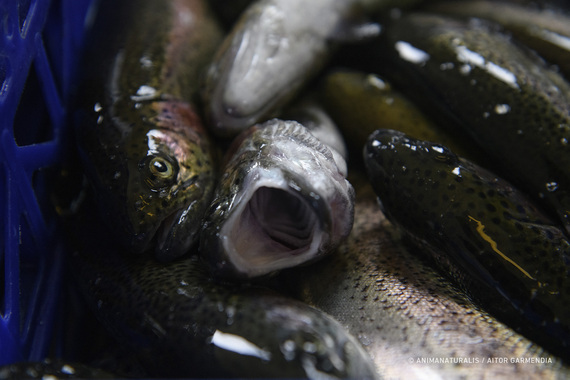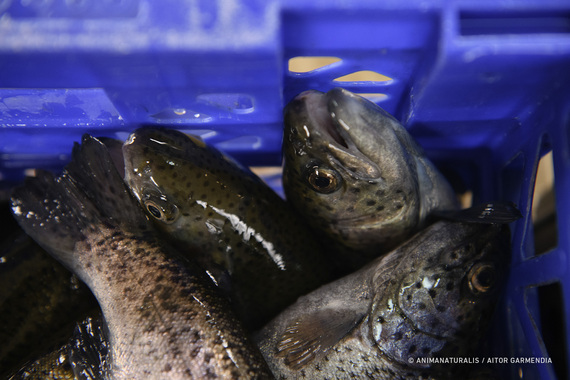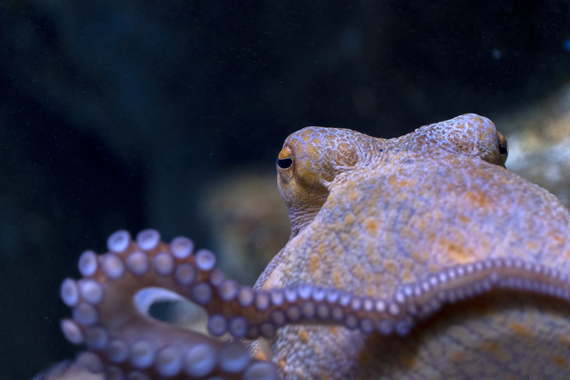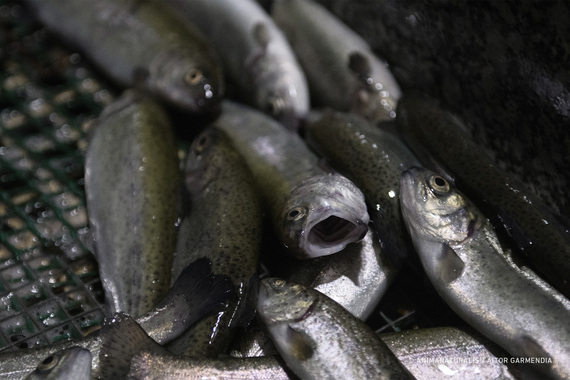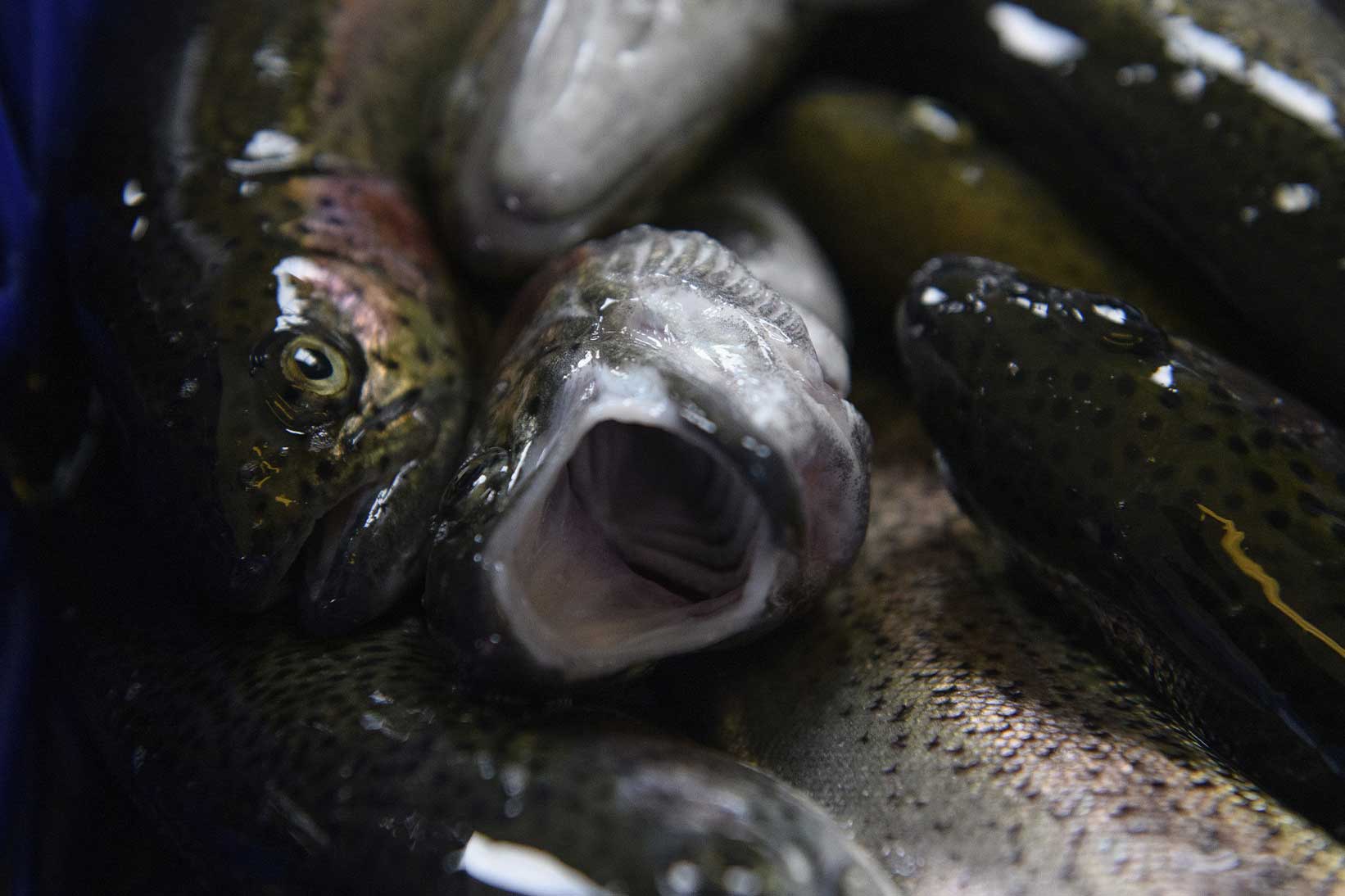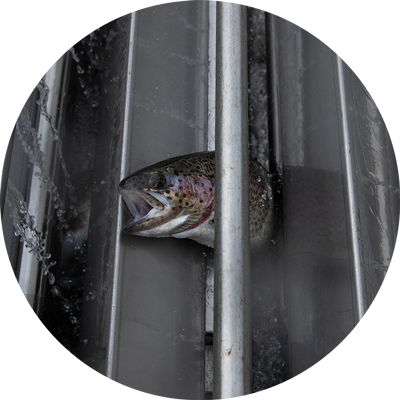
Agony Underwater
AnimaNaturalis presents its investigation exposing the reality of fish farms in Spain, where an immense number of animals suffer every day without any specific regulations to protect their basic interests. Since we cannot hear their screams and their agony is drowned underwater, they seem invisible.
More than 30 million rainbow trout are raised for consumption, representing 70% of freshwater fish in such facilities. The stress they endure is constant: fights over food, injuries and slaughter without effective stunning. Spain is the EU’s leading producer and is responsible each year for over 254 million fish—both marine and freshwater—without any national welfare legislation.
To change this reality, we propose drastically reducing or eliminating fish consumption and choosing plant-based alternatives, while urgently elevating the legal protection of fish to the level of other farm animals.
The Truth of Fish Farms Revealed!
Spain is responsible for the suffering of over 254 million fish each year in its fish farms, where they are raised and slaughtered as if they were mere products. According to the pioneering investigation by AnimaNaturalis, living and dying conditions in these facilities are extremely cruel and opaque, despite fish being recognized as sentient beings from 2009. The level of suffering, lack of adequate stunning, and high mortality make this industry one of the most neglected in terms of animal welfare across the European Union.
Let’s raise our voices to demand that authorities and companies commit to eliminating cage systems in all intensive fish farms. Fish do not deserve to suffer under these conditions!
Breeding and Fattening
In fish farms, trout undergo a wholly artificial reproduction cycle: they are anesthetized to manually extract eggs and milt, the fry spend their first weeks in enclosed tanks, and then compete in densely stocked tanks, causing chronic stress and depriving the fish of any natural stimulation. Their fattening, which lasts between 9 and 20 months, relies on processed feeds that neither satisfy their dietary needs nor replicate the variety of prey in their habitat, and is adjusted to the pale flesh demanded by the market. Additionally, intensive breeding consumes up to five kilos of wild fish for every kilo of trout produced and reduces their lifespan from up to 10 years in the wild to barely one or two.
Overcrowding
Overcrowding raises chronic stress in fish, spiking cortisol levels and triggering the breakdown of muscle proteins, which reduces their growth and body mass. Moreover, the immune system weakens, increasing vulnerability to diseases, while physical wear—such as fin erosion and scale loss—and stereotypical behaviors become more frequent. High stocking density also degrades water quality: it lowers available oxygen and raises toxic ammonia due to increased waste excretion, fostering aggression and competition for food, as dominant individuals monopolize feed and marginalize others, further amplifying stress and injuries within the group.
Sorting
Trout sorting often uses suction machines that rapidly vacuum fish to separate them by size. This method causes violent handling that leads to bruising, fin and scale damage, and elevated cortisol from stress. In smaller facilities or alternative methods, manual or mechanical nets entangle fish, causing friction wounds and exposing them to air for several minutes. If out of water for more than 15 seconds—unless anesthetized—they suffer asphyxiation and disorientation, and may fall, collide, fracture bones, or even die. All in pursuit of speed and low cost, disregarding animal welfare.
Transport
Transporting fish to the slaughterhouse—often in live tanks on boats or water containers—subjects them to low oxygen levels that reduce activity and cause high stress. Overcrowding in these containers creates anxiety and erratic movements, increasing the risk of bruises and abrasions from crowding. Moreover, lack of strict water quality control during transit can elevate ammonia levels, further worsening the suffering. Rough handling when loading and unloading containers contributes to physical injuries and extends stress until slaughter, making their final life stage particularly traumatic.
Cold and Electrical Slaughter
The most common method in fish farms is thermal shock: fish are submerged in ice or ice-slurry water for up to 90 minutes, suffering hypothermia and asphyxiation agony while conscious for much of the time. Although economical, this system causes prolonged suffering as their gills fail under the cold. Electrical stunning is offered as a “more humane” alternative, but poorly calibrated shocks often leave many fish semi-stunned and conscious during gutting, displaying agonizing movements and breathing difficulties, violating Regulation (EC) 1099/2009, which prohibits causing “avoidable pain, distress or suffering.”
Percussion Slaughter
Percussion, considered effective if applied correctly, suffers high error rates due to mechanical failures or improper manual handling, leaving fish conscious during cutting or decapitation. Additionally, pre-slaughter fasting—allowed up to six days before killing to improve hygiene—weaken the trout’s immune system, induce behavioral stress, and increase intra-species aggression, counteracting the goal of minimizing suffering. Overall, the lack of specific welfare regulations in Spanish fish farms allows these cruel methods to persist, underscoring the urgent need for reforms to ensure truly painless slaughter.
Disease
Diseases in rainbow trout farms arise directly from stress and overcrowding: bacterial enteritis and furunculosis cause skin ulcers and high mortality; parasites (Argulus, Lepeophtheirus) damage skin and gills and spread rapidly; and viruses like Infectious Pancreatic Necrosis (IPN) trigger massive outbreaks requiring mass antibiotic and antiparasitic treatments. Under Regulation 2016/429, most of these diseases are not notifiable, lack standardized veterinary protocols, and have unreliable epidemiological data, hindering control and worsening fish suffering.
Antibiotics
Extensive antibiotic use in aquaculture promotes resistance affecting human and animal health—the residues can reach consumers—and antiparasitics and other chemicals contaminate water and soil. Additionally, plastics, oils, and sanitary waste from fish farms harm aquatic biodiversity, alter water quality, and disrupt food chains. The “Strategic Guidelines for Sustainable Aquaculture 2021–2030” report by MAPA acknowledges disease as a production limitation and welfare issue, while the industry admits the lack of epidemiological studies and the challenge of controlling widespread epizootics.
Packaging
Packaging prolongs trout suffering, as many still show vital signs after slaughter and chilling when placed in transport boxes. When stacked carelessly, some fish are asphyxiated or crushed, reflecting grave post-mortem handling negligence.
This stage highlights the absence of specific regulations guaranteeing fish welfare until the last moment, allowing abuse to continue even when they are destined for market.
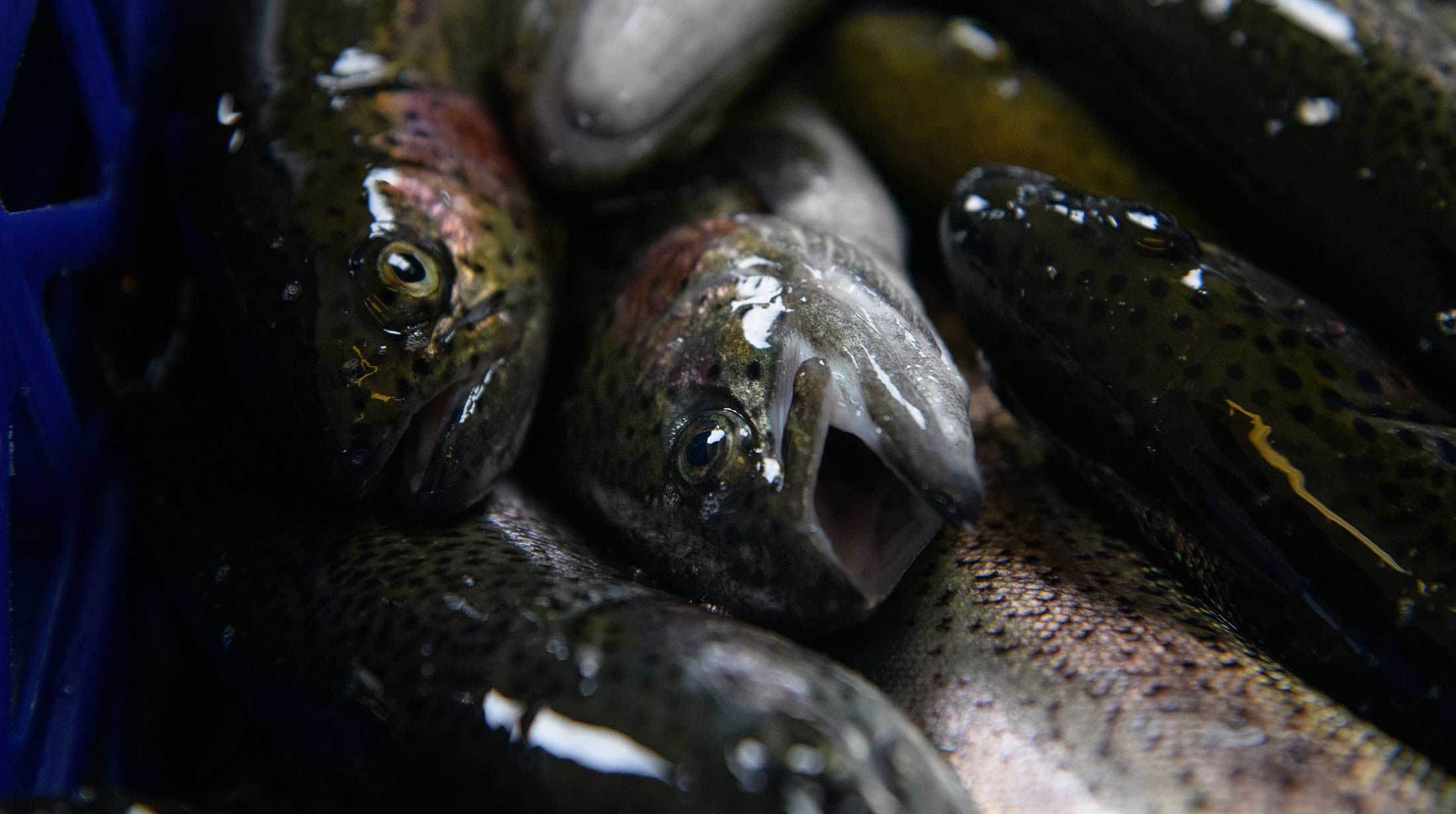
The invisible agony of fish in Spain's fish farms
16 junio 2025
Spain is the leading aquaculture producer in the European Union, resulting in over 254 million fish bred and slaughtered annually in industrial fish farms. Yet these animals lack real protection, as revealed by our latest investigation.
9 Out of 10 europeans demand end to suffering of fish in aquaculture farms
24 septiembre 2024
A new and exhaustive survey in the European Union uncovers an uncomfortable truth: citizens clamor for protection for the billions of fish suffering in aquaculture farms, but alarming ignorance of cruel practices and lack of specific laws allow this torture to continue. It's time to open our eyes, listen to their silent agony, and act decisively.
We present a resource to know the status of Nueva Pescanova permits
01 agosto 2023
The lack of transparency regarding the status of the necessary permits for the installation of the first industrial octopus farm in Las Palmas has meant that we must file a contentious-administrative appeal before the Court of Santa Cruz de Tenerife.
Study estimates that over 171 billion fish are slaughtered every year in fish farms
06 febrero 2023
While 124 billion fish die annually in fish farms under conditions of systemic torture, the industry reduces them to “biomass” to obscure their suffering. Science confirms their sentience, but 72% lack legal protection at the time of slaughter. The FAO is complicit by omitting individual counts.
Support our campaign
Your contribution will allow us to carry this campaign through to the very end.
